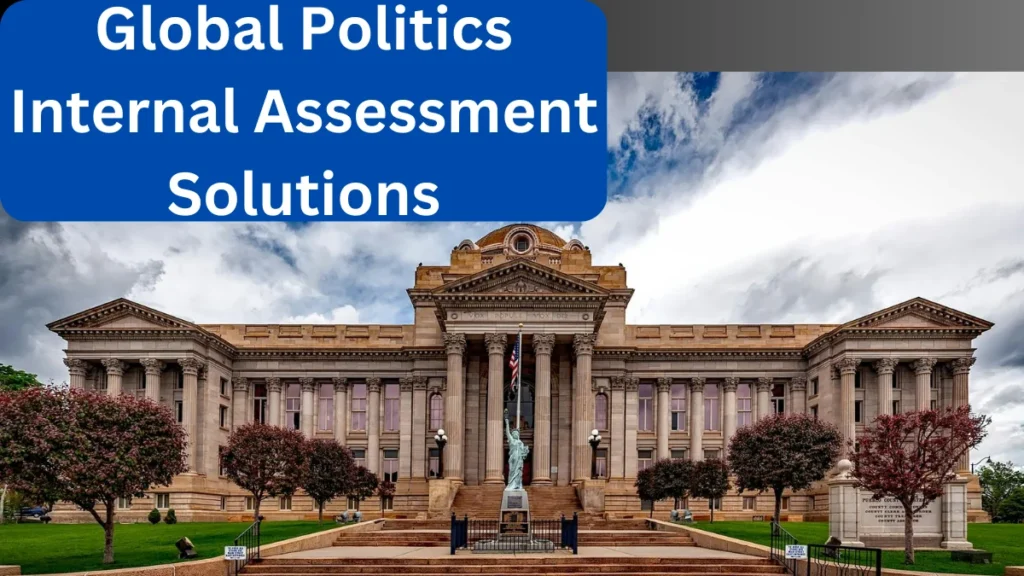
Global Politics Internal Assessment Solution: In this article, we will provide Global Politics Internal Assessment Solutions that come under the BA Hons course at Delhi University. Serial number of questions could differ, so read the question carefully.
Q1: When was the Partial Test Ban Treaty Signed?
A1: 1989
Q2: When was the Copenhagen Accord Signed?
A2: 1984
Q3: “Boomerang Effect” in the context of social movements and globalization was introduced by
A3: Martin Luther King Jr.
Q4: When was the UNFCCC signed?
A4: 1992
Q5: Pragmatic approach is based on viewing which of these interacts as the fundamental element of political change
A5: Non state actors and NGOs
Q6: Direct or Indirect transfer of nuclear technologies from one nation-state to another is called
A6: None of the above
Q7: Who introduced the concept of “Drain of Wealth”?
A7: Gandhi
Q8: What is the outlook of optimistic strand of structuralism?
A8: Insists on role of democracy
Q9: Montreal Protocol is related to
A9: None of the above
Q10: The nuclear supplier’s group was founded after which country conducted nuclear tests?
A10: China
Q11: NEIO emerged in the aftermath of?
A11: Cold War
Q12: Partial Test Ban Treaty does not prohibit the testing of nuclear bombs in which of these conditions?
A12: Under Water
Q13: What does NEIO stand for?
A13: New International Ethnic Operation
Q14: Which out of these is the latest trend component of Globalization?
A14: TerritorializationQ
Q15: Which treaty recognized five countries as nuclear weapon states?
A15: Comprehensive Test Ban Treaty
Q16: Emission of which one of these is to reduced in a focused manner according to Montreal Protocol?
A16: Methane
Q17: When was the Nuclear Supplier Group (NSG) founded?
A17: 1988
Q18: Anti-Ballistic Missile Treaty was signed in the year?
A18: None of the above
Q19: Which of these is a major determinant in the “Cultural Framing Theory”?
A19: Both of these
Q20: Which method is inherent in the Resource Mobilization Theory/Mobilization structure theory?
A20: Technical
Q21: Emission trading as a provision was introduced in the year
A21: None of the above
Q22: Which one of these is a benefit of the Carbon Market?
A22: Inflation
Q23: Which one of these parties was not present on the eve of signing of PTBT/LTBT?
A23: None of the above
Q24: Concept of “Clash of Civilizations” is put forward by?
A24: Hegel
Q25: Which one of these is an accurate description of ‘Vertical Proliferation’?
A25: Weapns upgradation using cutting-edge technology
Q26: Who defines Euro-centrism most accurately?
A26: Disproportionate focus on and glorification of Europs
Q27: Who amongst these is a prime exponent of ‘Political Opportunity Structure Theory’?
A27: Sidney Tarrow
Problems in SOL Admit Card 2/4/6 Semester 2024?
Q28: The world society theory is rooted in the work of which of these theorists?
A28: Mary Wollstonecraft
Q29: The ‘Heartland’ theory emphasizes the role of?
A29: Leadership
Q30: Which one of these countries has not signed the NPT so far?
A30: South Africa
Q31: The opposite value of anti-thesis of anthropocentrism would be best described as?
A31: ego-centrism
Q32: UNFCCC was signed at the?
A32: None of the above
Q33: Which one of these is not a part of ‘Global Commons’?
A33: Weapons of mass destruction (WMD)
These are the Global Politics Internal Assessment Solutions for BA Hons. DU SOL. The order of the questions in the internal assessment may be changed so read carefully.